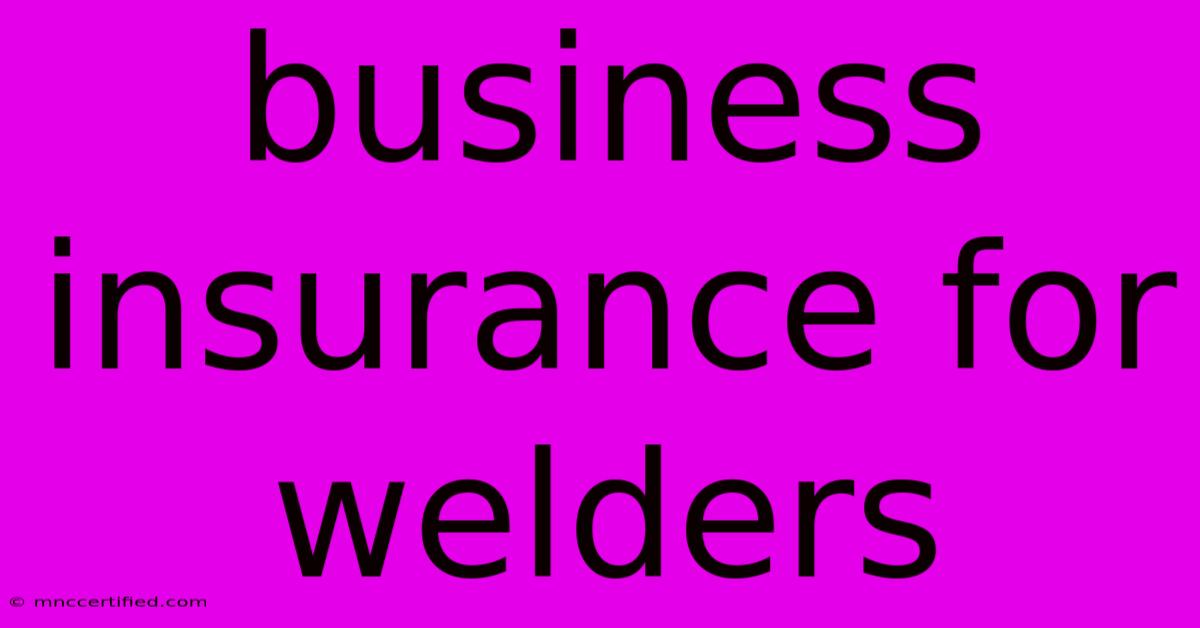Business Insurance For Welders

Table of Contents
Business Insurance for Welders: Protecting Your Spark
Welding is a skilled trade demanding precision, expertise, and – crucially – robust safety measures. But even with the best precautions, accidents can happen. That's why securing the right business insurance for welders is paramount. This comprehensive guide will illuminate the essential coverages every welding business needs, helping you protect your assets, employees, and future.
Understanding Your Welding Business Risks
Before diving into specific policies, it's vital to understand the inherent risks associated with welding. These risks can be broadly categorized:
1. Property Damage:
- Fire: Welding involves extremely high temperatures, making fire a significant risk. A single spark can ignite flammable materials, causing substantial property damage to your workshop, client property, or even neighboring buildings.
- Equipment Damage: Welding equipment is expensive. Malfunctions, accidents, or even simple wear and tear can lead to costly repairs or replacements.
- Materials Damage: The heat from welding can damage the materials you're working with, leading to wasted materials and lost revenue.
2. Liability:
- Bodily Injury: Welding accidents can cause serious burns, eye injuries, or respiratory problems. Liability insurance protects you from lawsuits arising from injuries sustained by employees, clients, or members of the public.
- Property Damage to Others: As mentioned above, fires or other accidents could damage property beyond your own. Liability insurance covers these situations.
- Product Liability: If you manufacture or fabricate welded products, product liability insurance protects you against claims related to defects in your work.
3. Business Interruption:
- Accidents or Damage: A significant accident or damage to your workshop could force you to cease operations temporarily. Business interruption insurance covers lost income during this period.
Essential Insurance Policies for Welders
Based on the risks identified, several insurance policies are crucial for welders:
1. General Liability Insurance: The Foundation of Your Protection
This is arguably the most important policy. It covers bodily injury and property damage caused by your business operations. This includes injuries to clients, employees, or the public, and damage to their property. Consider this your first line of defense against lawsuits.
2. Commercial Property Insurance: Protecting Your Assets
This covers damage to your workshop, equipment, and inventory caused by fire, theft, vandalism, or other covered perils. Ensure your policy adequately covers the value of your specialized welding equipment.
3. Workers' Compensation Insurance (if applicable): Protecting Your Employees
If you employ welders, workers' compensation insurance is legally mandated in many jurisdictions. It covers medical expenses and lost wages for employees injured on the job. Non-compliance can result in significant penalties.
4. Commercial Auto Insurance: Covering Vehicle-Related Risks
If you use vehicles for business purposes (e.g., transporting equipment or materials), commercial auto insurance is essential. This extends beyond standard liability to cover damages to your vehicle and provides broader liability coverage compared to personal auto insurance.
5. Equipment Breakdown Insurance: Protecting Your Investments
This policy covers the cost of repairing or replacing your welding equipment due to mechanical or electrical breakdowns. This can be especially valuable given the specialized and often expensive nature of welding equipment.
6. Umbrella Liability Insurance: Expanding Your Coverage
An umbrella liability policy provides extra liability coverage beyond your general liability and auto policies. It's a valuable safeguard against catastrophic events.
Finding the Right Insurance Provider for Your Welding Business
Choosing the right insurance provider involves careful consideration:
- Get multiple quotes: Don't settle for the first quote you receive. Compare policies and prices from different providers.
- Understand policy exclusions: Carefully review the policy documents to understand what is and isn't covered.
- Check the provider's financial stability: Ensure the provider has a strong financial rating to ensure they can pay out claims.
- Consider your specific needs: The ideal policy will be tailored to the unique aspects of your welding business, including the types of welding you perform and the size of your operation.
Protecting your welding business requires a proactive approach to risk management. By securing the appropriate insurance coverage, you're not just safeguarding your assets, but also ensuring the long-term sustainability and success of your enterprise. Don't wait for an accident – invest in the right insurance today.

Thank you for visiting our website wich cover about Business Insurance For Welders. We hope the information provided has been useful to you. Feel free to contact us if you have any questions or need further assistance. See you next time and dont miss to bookmark.
Featured Posts
-
Cody Jarrett Shelter Insurance
Nov 27, 2024
-
Bissonnette Ex Coyote Assaulted Outside Venue
Nov 27, 2024
-
Empty Shelves At Morrisons Shopper Anger
Nov 27, 2024
-
Viral Petition Identifying The Business Owner
Nov 27, 2024
-
Barcelona Vs Brest Lineups And Team News
Nov 27, 2024